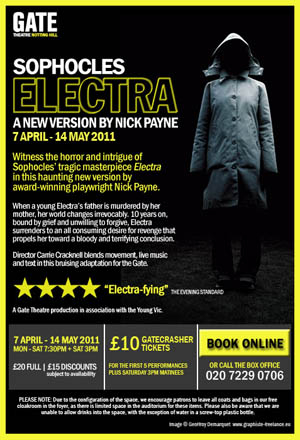 Reviews
Reviews
Sophocles' Electra
Gate Theatre, Notting Hill, London W11, 18 April 2011
A new version by Nick Payne, directed by Carrie Cracknell
Its been said that the story of Electra and Orestes and their quest for vengeance for their father Agamemnon - which can only be fulfilled by killing their mother Clytemnestra - was for Aeschylus a problem (Choephori; Libation bearers), for Sophocles a drama (Electra) and Euripides (Electra, Orestes) a crime. Nick seems to demand all three slices of the cake in his version (very much a version - certainly not a translation) - a moral problem, a crime, and a drama - at any rate in the sense that it was unremittingly theatrical.
The subtle lighting, the pounding industrial music, the shadowy figures half glimpsed tell us from the start that we are visually in the world of Danish TV's Forbrydelsen (The Killing). The action is all indoors, dimly (though beautifully) lit. Immediately we're a long way from Greek tragedy, where action [in Greek drama], however horrific, must be exposed to the light of day. In the Gate, the horror was enclosed, secret, in an oblong chamber. We, the audience, seated in a single row around the perimeter seemed like intruders, voyeurs - bringing to mind the "audience" of ancient tourists who witnessed the horrific rites of initiation in the Temple of Artemis Orthia, Sparta.
There were several additions to Sophocles plot - generally agreed to have been quite a good one! Our Agamemnon didn't die in his bath (an Aeschylean touch anyway), but, after his stabbing, was apparently dragged, dripping with blood and water by his distraught daughter into her bedroom, where he finally expired, leaving bloodstains on the floor for Electra to scrub at passionately at various points during the play.
Young Orestes was fully aware while Electra and the Tutor were trying to smuggle him out of the palace after his father's murder, asking questions, and refusing to leave.
Orestes, according to Sophocles' version of his fictitious death, was conveniently mangled in a chariot crash to provide an easy explanation for the swift cremation. In the Payne version he was found drowned in a river. A death by water like his father's (neat?), which, though, raises unnecessary worries in his sister (and us). Was it suicide, madness (why else all the detail about his sunburn the previous day unless we're being asked to consider sunstroke?) or a plain accident? Electra says "I found your story very difficult to listen to." So did I - for wondering what was the point of all the circumstantial stuff - it seemed that the narrator was enjoying the horror of his story well beyond the details necessary for authenticity. It just got me thinking about how difficult it might be to cremate a drowned corpse and have the cremains in an urn by next day!
Electra is deprived of our sympathy (however much we admire Cath Whitefield's stunning performance) - like Euripides' heroine, because she's allowed no tenderness. She demands to handle the urn (actually a small box), and shrieks, growls and whines, as she's done throughout the drama: she's denied her moment of quietness with her brother's memory.
Orestes too is not the straightforward hero of Sophocles. The lie, as well as its execution, is all down to the paidagogos (hinting at the weakness he shows in Euripides' Electra). When he meets his sister - and she's told him at once who she is - he can't even be polite to her, let alone sympathetic - and she holds the cruelty of the lie against him and is equally cold. Their distance apart is made physical by the open grave which Electra has spent some ten minutes excavating in the stage floor. With much panting, grunting and growling she's ripped up half a dozen large tiles, removed the floorboards below, and torn away the beams supporting them, and then started digging out spadesful of earth. Would she discover the Prince Albert pub underneath it all, I wondered? Presumably this was her final attempt to remove Agamemnon's bloodstains, as well as providing an outlet for the aggression and frustration released by her brother's apparent death. Later it's to be Clytemnestra's tomb, after Orestes' gruesome chase and wrestling match with his mother.
We're spared a second onstage murder (phew!), because Aegisthus does not appear - the last line of the play answers the question what will you do to him? "Kill him". Sophocles could create sympathy for Clytemnestra by focusing on Aegisthus' part in the drama. Payne made us sorry for Clytemnestra, because Orestes is such a brute - and her killing is so horrific that even Electra feels sorry for her. Where was the restraining touch of Pylades? We missed him.
Only Chrysothemis stuck to the part that Sophocles wrote for her - quite a relief. But Payne bullied and intimidated us into his view of the story as a relentless psychodrama. Sophocles humanised Aeschylus' mighty tale of divine confrontation. Euripides showed that without the gods its just a rather sordid story of murder and revenge. Sophocles showed what happened - and left the spectators to wonder who was right and who was wrong.
This production was effectively acted, stunningly lit - and the sound was truly brilliant. But there was no tragedy, and, despite "dramatic" acting, little drama, in the sense of suspense and surprise (plenty of both in Sophocles). Just a long rant - which, digested in the manner of the Guardian's John Crace, would amount to little more than Kevin the Teenager's "It's so unfair".

